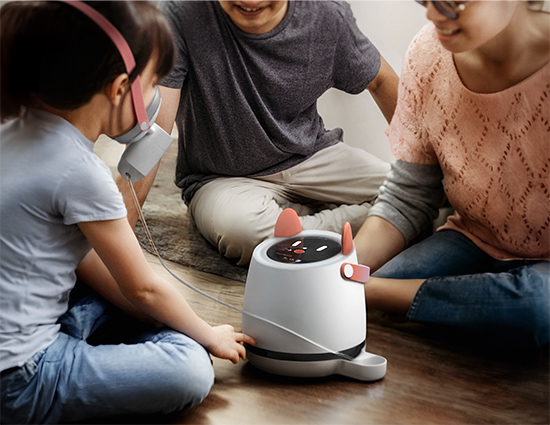AI innovation is driving a digital surgery push that promises huge business growth and enduring market leadership. The question is, who will be first to seize the big prize?
I believe success will go to the platform owner who will take a human-machine understanding (HMU) approach to dramatically reduce variability of surgical outcomes. The team here at CC knows how to identify the variables – and we are in active collaboration with industry leaders to build the optimal system interventions that will improve the outcomes.
We believe this alliance will open the way to a next-generation digital surgery platform that surgeons and their teams like to use, trust, and depend on. The key to unlocking success here is empathetic machines that understand humans deeply – exactly the type of machines that we are actively developing for other sectors of industry.
Digital surgery platform
CC’s work in ヒューマンマシンインタフェース has the potential to deliver a personalised support system that ‘gets to know you as you grow’. The commercial implications for a digital surgery platform developed along these lines are highly significant. Imagine, for example, a virtual coach within a system that continuously enriches itself with personalised insight as it intuitively nurtures the surgeon from initial training to the operating room and on throughout their career. I think it’s fair to assert that successful surgeons would be reluctant to switch to another system at any stage.
Such an HMU-led training tool would coach you with the training you need, the tools you need, the regime you need, the cadence you need and the feedback you need. This could also be extrapolated to the dynamics of the team environment. For example, the system could instigate communication between a distracted team member with an engaged team member to ensure optimal efficiency.
We unveiled our work in HMU, and its applicability to digital surgery, at the Hamlyn Symposium on Medical Robotics at London’s Royal Geographic Society earlier this year. It was great to see the interest in the topic and the conversations it sparked. The industry is moving towards further integration of human sensing and interfacing technology into their platforms. From eye-tracking and haptics to tracking of various behavioural metrics of performance, the technological infrastructure for human understanding is falling into place. Questions remain around how to best leverage this infrastructure and the resulting data, to support surgeons and surgical teams, from training to operation.
Surgical platforms comprise the robotic machine, the interface with the surgeon and the data. Achieving more with that data is the coming role for AI and human-machine understanding. Why? Put simply, better surgical outcomes are not all about better robotics, better tools or better imaging. We have very robust and predictable tools, but still often end up with unpredictable outcomes because of the unpredictability of humans.
Transformative human-machine understanding
Human-machine understanding can change that. We can interpret the wealth of available data and measure the mental and physical state of surgeons to determine whether they are physically comfortable, whether they are cognitively pressured, or even whether the surgical group is teaming appropriately.
Variability of surgical outcomes also depend on expertise, of course. For a given procedure there will be a better surgeon and an inferior surgeon. But even the most expert surgeon can have a bad day, be frustrated by unexpected complications, worried about a family problem, have a backache, be tired after back-to-back procedures – a whole mix of mental and physical states will have an effect.
The surgeon is one piece in a complex jigsaw. Increasingly, teams across the world are undermined by staff shortages – causing a lack of continuity as individuals come and go within a team. Rather than running like clockwork, procedures become disjointed as communication becomes suboptimal and less intuitive. A report by the American Association of Medical Colleges projects shortages of 15,800-30,200 in all surgical specialities by 2034.
Tackling variability of surgical outcomes
So how exactly does human-machine understanding allow us to tackle variability of outcomes? In short, by harnessing sensing techniques and data insights we can understand the surgeon at a deep level – then intervene with the right support in the right way at the right time. For an operating room scenario, the priority will be to determine the surgeon’s physical and mental state, identify any problems they are facing, and then determine whether it is rooted in an individual or teaming issue.
Biomarkers might include motion and kinetics, eye movements and pupil dilation, speech, body temperature and so on. Combining measurements here with HMU techniques will enable us to understand the problem. But determining the most appropriate intervention is highly use case dependent and can be challenging given different constraints faced. This is why we are joining forces with industry partners to explore the myriad of options and figure out optimal responses.
When it comes to potential interventions, some will be specific, some more abstract. We can expect plenty of focus on the mechanics of robotic control, for example. Many interventions will be in form of adjustments to various interfaces already present in the operating room. At the physical interface with the surgeon’s hands, the system could adjust haptic feedback, provide different types of audible alarms based on the surgeon’s state, or adapt visual heatmaps to provide decision support based on their needs.
The key point here is that it’s not necessarily about coming up with new interfaces or ways to nudge the surgeon – it can be about adjusting options within existing interfaces, of which there are many. Essentially, it’s about identifying the knobs we can turn to tune the experience to the surgeon’s needs.
Appropriate surgery interventions
Working alongside the HMU and AI experts at CC, a potential manufacturer could build appropriate interventions into their digital surgery platform. With the correct research-based knowledge, the manufacturer will also be fully aware of what interventions a surgeon will or won’t accept.
Transformative value awaits the industry player who can seize the potential of HMU in digital surgery. This technology is coming. It’s already happening in other sectors, and, with AI advances, it will grow fast. If you are developing the next iteration of your platform you want to ensure it’s futureproofed for advances in HMU – so that when the right models are available to harness human data and interfaces, you’re well placed to leverage them without overhauling your platform. This is the kind of opportunities we are working on with industry leaders, giving them the competitive edge in human understanding technology.
This is a sector of global healthcare that is well placed for bold innovation. Operating rooms are brimming with advanced technology and computing power. They represent an ideal, highly controlled environment for the AI models and highly precise sensors we’d need to harvest and interpret human data. Cracking this challenge and having the ability to manage variabilities to an unprecedented degree will have a huge impact on surgical outcomes around the world. For me, this makes for highly investable innovation. If you’d like to continue the conversation, please email me. I’d love to hear from you.





